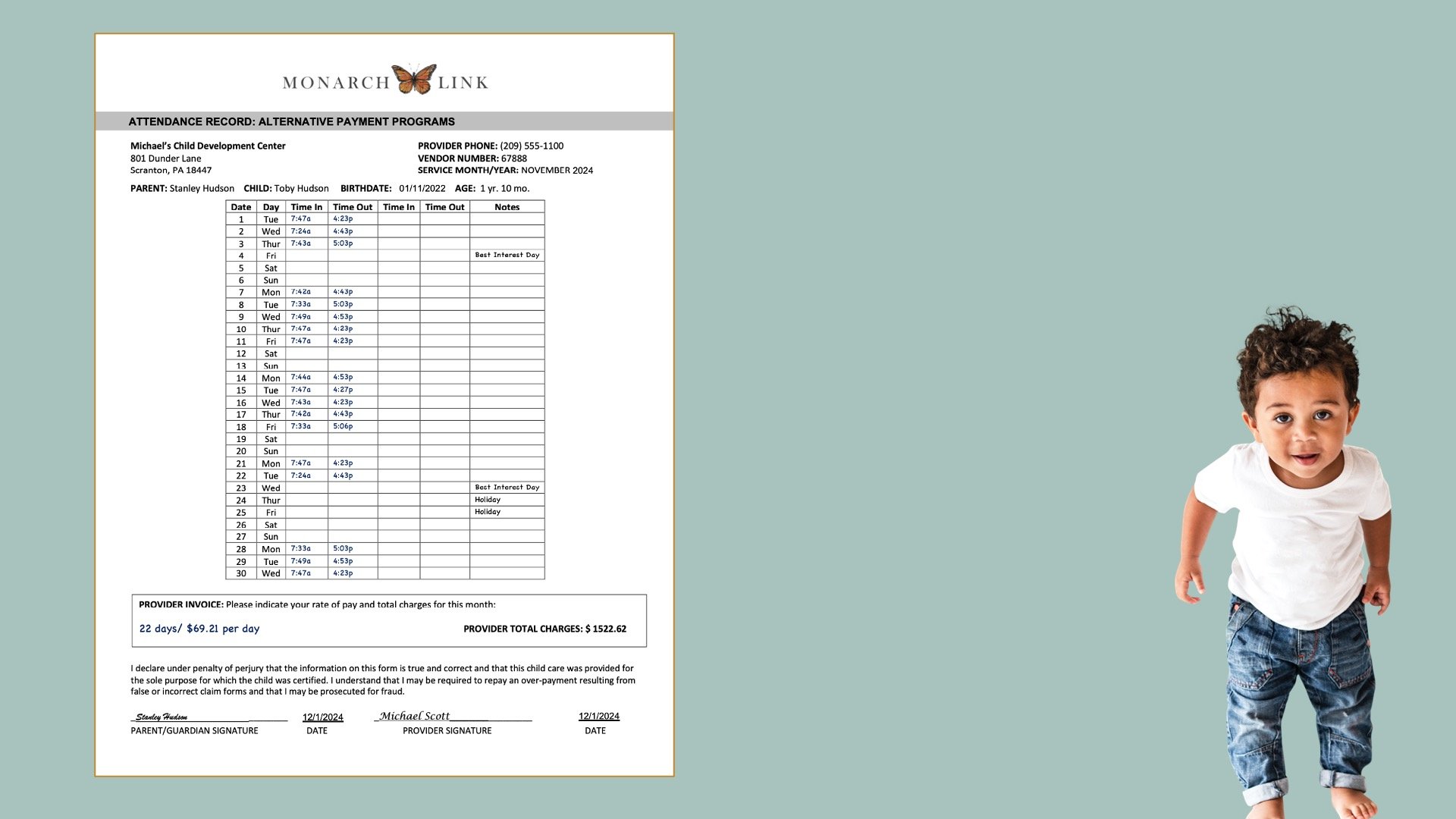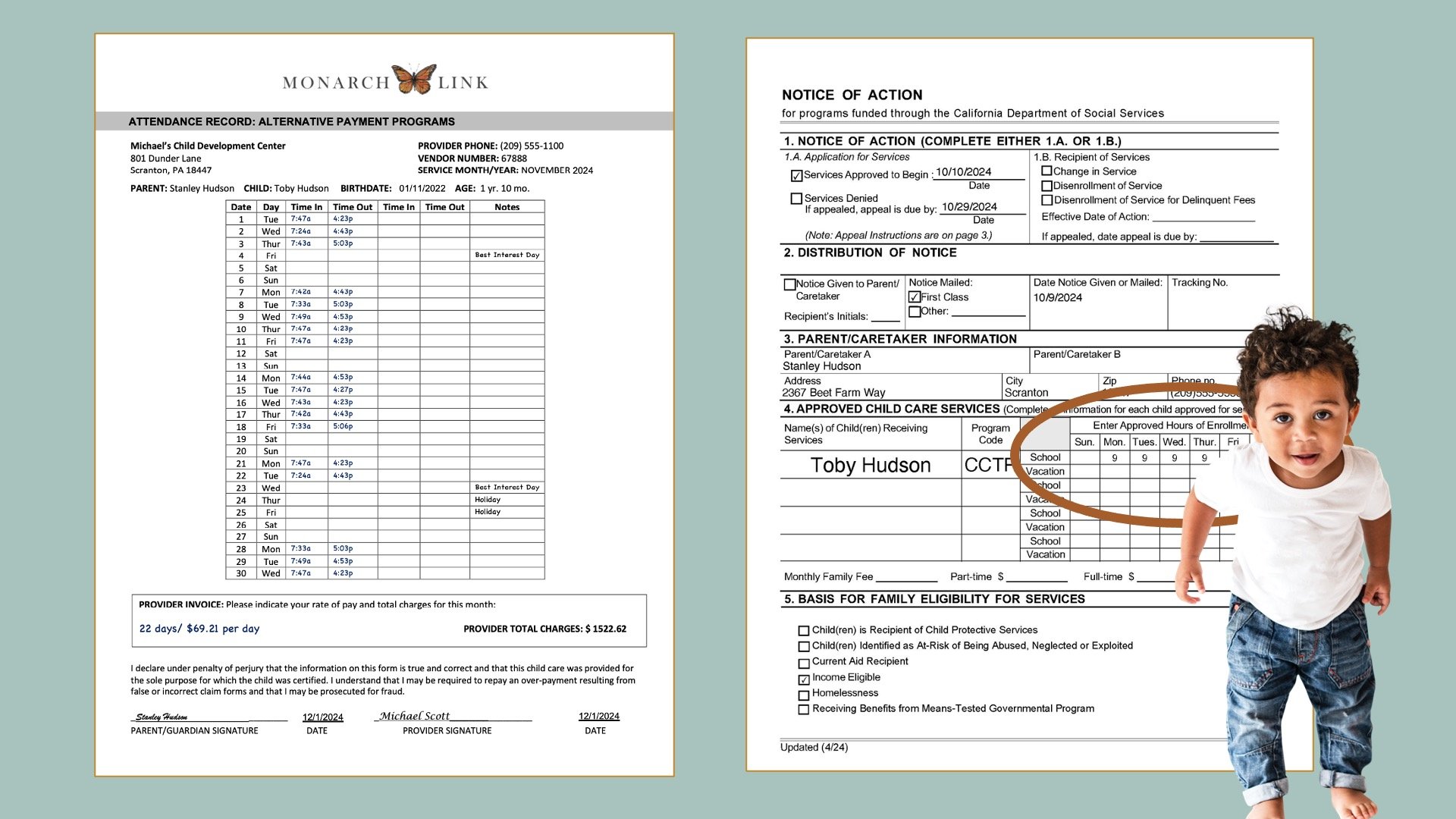Lesson 5
Provider Reimbursement
Lesson 6
Parent Involvement & Education
Lesson 7
Health & Social Services
Lesson 8
Site Licensure
Lesson 9
Adult-Child Ratios
Lesson 10
Environment Rating Scale
Lesson 11
Nutritional Needs
Lesson 12
Desired Results Profile & Data
Lesson 13
Qualified Director
Lesson 14
Staff Development/Provider Support
Lesson 15
Refrain from Religious Instruction
Lesson 16
Inventory Records
Lesson 17
Annual Evaluation Plan
Lesson 18
Fiscal Essentials: CFCC Contract Type
Lesson 19
Fiscal Essentials: CCTR Contract Type
Lesson 20
Audits
Lesson 21
CDMIS 801A & 801B Reporting
Lesson 22
Contractor Policies
Compliance Indicator
Reimburse each provider no more than that provider charges families, not to exceed the maximum subsidy amount which is the applicable regional market rate based on the age of the child, certified need for childcare and the facility type. Providers are reimbursed based on current regulations.
Regulations/Reference
CCD Program Instrument: I. Family Files CCD 06
Welfare & Institutions Code: 10280
Title 5: 18074.2, 18075, 18075.1, 18076.1, 18076.2, 18084.2, 18226, 18228
Monitoring Review Evidence
Provider Documentation of Childcare Certificate
Provider Rates
Sign-in/Sign-out Records/Invoice
Provider Payment
Written Materials to Parents
Watch Video Lesson ❯
Sample Forms/Tools ❯
Review Sketch Pad Notes ❯
Rate Determination
Under the General Child Care contract, a state contractor is reimbursed based on their contracted rate for each child day of enrollment. In turn providers are reimbursed based on either their non-subsidized rate or the agency determined rate.
The provider reimbursement rate required specific considerations such as:
Considering the program’s operational costs
Reimbursing providers based on the 70/30 Rule
70% of contract funds are earmarked for provider reimbursement while the remaining 30% is set aside for Administrative & Support Costs.
Considering their counties RMR Ceilings
What this might look like in a program:
Establish rate categories such as:
Infants
Toddlers
Three & Older
Exceptional Needs
Within each of these categories, providers would be reimbursed 70% of the contractor’s adjusted rate for each of those categories at either a PT or FT rate.
Reimbursable Care
Through June 30, 2025, CCTR FCCHEN providers will be reimbursed based on the family’s maximum certified need rather than attendance.
When a parent has consistent certified days and hours of care, reimbursement to both a licensed and license-exempt provider is based on the family’s maximum authorized hours of care.
When a parent has a variable schedule, reimbursement is based on the family’s maximum authorized hours of care.
It is common to follow the same CCTR guidelines for reimbursable absences such as:
Excused absences
Alternate provider days (must be with a FCCHEN provider)
What this might look like in a program:
Contractors develop a system to track & monitor reimbursable care that is limited to ensure overpayment does not occur.
Any change to the certified need must be based upon a request by the parent & communicated in writing to the provider on the same day as family Notice of Action.
Non-Reimbursable Care
Reimbursable care does not include:
Scheduled instructional minutes for a school aged child
Time when the child is receiving any other child care & development services
When a provider is not open
Effective November 15, 2021, for school-age children, contractors must only reimburse providers during non-school hours when a school-age child is enrolled and participating in in-person instruction or for days/hours that a school-age child is participating in distance learning while in a child care setting only when the child’s school is closed and in-person instruction is not available.
NOTE: Reimbursement may not be issued to providers for any days/hours of care that take place when in-person instruction is available, but the parent opts to enroll their school-age child in remote learning.
Provider Reimbursement
When applying the FCCHEN Provider Rate, use the age of the child, adjustment factor criteria, & certified need for child care to identify the applicable rate category.
Based on the certified days & hours of services determined at the time of certification or recertification as documented on the Notice of Action, all providers are reimbursed at the daily rate.
Full-time Daily: Child’s certified schedule is 25 hours or more per week
Part-time Daily: Child’s certified schedule is less than 25 hours total per week
Issuing Reimbursement
Contractors may set up an electronic reimbursement program for providers so that the reimbursement to providers may be electronically transmitted to the financial institution of their choice.
NOTE: Contractors may not require the providers to use direct deposit or any other form of electronic reimbursement to receive their reimbursements.
Provide a description of the reimbursement to the provider, including:
Child(ren) served
Month of service covered by the reimbursement
Misleading Records
Contractors should not make payment to a provider if they have information that might include, but is not limited to, the following:
The provider was incarcerated during the time s/he claimed to have provided care.
The provider was out-of-state during the time she or he claimed to have provided care.
A licensed provider lost their license & was directed to cease providing care but did not
If a contractor receives an attendance record that clearly reflects misleading or deceitful information, the contractor must follow their written polices & take appropriate action.
Complete Knowledge Check ❯
After reviewing the video lesson & sketch pad notes, it’s time to check for understanding by completing a Knowledge Check. Note that Individual Knowledge Checks will conclude with a Certificate.













